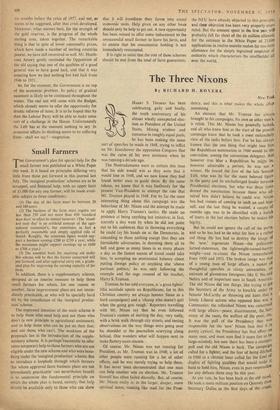Small Farmers
THE Government's plan for special help for the small farmer was published as a White Paper this week. It is based on principles differing very little from those put forward in this journal last July. The 'marginal production' schemes are to be scrapped. and financial help, with an upper limit of £1,000 for any one farmer, will be made avail- able subject to three conditions: (1) The size of the farm must be between 20 and 100 acres.
(2) The business of the farm must require not less than 250 and not more than 450 'standard man days' to effect its annual turnover. (The 'stand- ard man day' is an artificial concept of the agri-' cultural economist's, but constitutes in fact a perfectly reasonable and simply applied rule of thumb. Roughly, the minimum figure would sup- port a business earning £200 to £250 a year, while the maximum might support earnings up to £600 or £700 a year.) (3) The essential basis for receiving aid under this scheme will be that the farmer concerned will put forward, and after approval carry out, a gradu- ated plan for improving the earning capacity of his farm.
In addition, there is a supplementary scheme, designed as an interim measure to help those small farmers for whom, for one reason or another, farm improvement plans are not imme- diately practicable, or who will be specially hard hit by the cancellation of the 'marginal produc- tion' scheme.
The expressed intention of the main scheme is to help those who need help and not those who don't (a new principle in agricultural assistance), and to help those who can be put on their feet, and not those who can't. The weakness of the proposals lies in the introduction of the supple- mentary scheme. It is perhapsIreasonable to offer sonic temporary help to those farmers who are not eligible under the new scheme and who were bene- fiting under the 'marginal production' scheme. But to introduce a loophole through which farmers `for whom approved farm business plans are not immediately practicable' can nevertheless benefit is to undermine the fundamental principle on which the whole plan is based, namely, that help should be available only to those who can show that it will transform their farms into sound economic units. Help given on any other basis should only be help to get out. A rare opportunity has been missed to offer some inducement to the unsuccessful small farmer to leave his farm, and to ensure that his uneconomic holding is not immediately reoccupied.
It is right to insist that the cost of these schemes should be met from the total of farm guarantees; the NFU have already objected to this principle, and their objection has been very properly over- ruled. But the amount spent in the first year wig probably fall far short of the £6 million allowed, for the estimate in the White Paper of 25,000 applications in twelve months makes far too Mile allowance for the deeply ingrained suspicion of authority which characterises the smallholder all over the world.


































 Previous page
Previous page